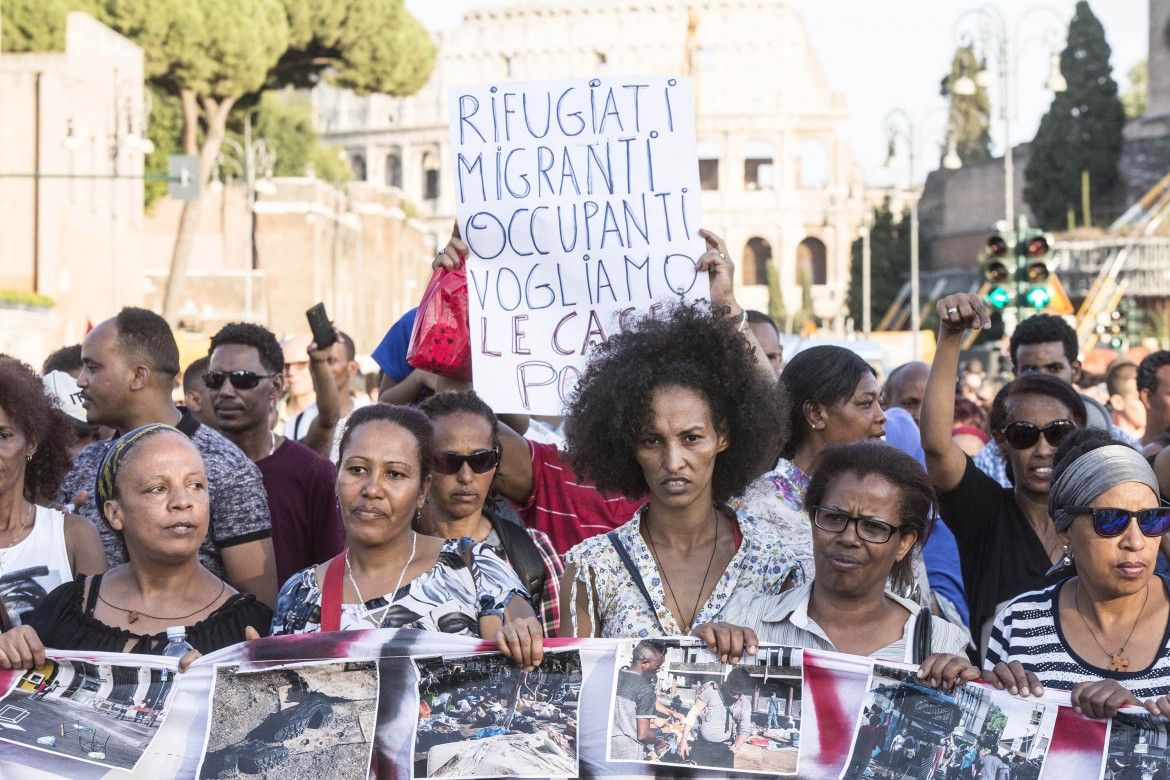Report
Declaring zero-tolerance for squatters, Salvini goes after the homeless
Citing ‘law and order,’ Italian Interior Minister Matteo Salvini has cleared the way for evictions without any concern for where they’ll go, leaving the city to facilitate the right to housing.

People feared that August would be a month full of evictions. Instead, Italy’s populist government has taken its fight against squatters quietly into September, issuing a carefully targeted, five-page memo that threatens to do more damage than a summer of evictions.
Through this document, Interior Minister Matteo Salvini is taking away the only guarantee made to those evicted by his predecessor, Marco Minniti. Now, in essence, the authorities will be able to return occupied buildings to their legal owners without having to worry about offering alternative housing to the squatters. According to Salvini—who is obviously unfamiliar with both the social constraints that the Italian Constitution imposes on private property and the procedural guarantees established by the United Nations with regard to evictions—this is simply a matter of defending the “sanctity” of the owners’ property rights.
Rome, with over 10,000 people who live in buildings occupied by organizations fighting for the right to housing, is the epicenter of the earthquake that could hit hundreds of occupied buildings across the country (for housing purposes and not only). And it is in Rome that the political combination first arose that has now led to Salvini’s wrecking ball being aimed at the abandoned buildings returned to social use by occupiers.
A year ago, Minniti issued his own memo in the aftermath of the disastrous eviction of Eritrean refugees from Piazza Indipendenza. Meanwhile, Rome mayor Virginia Raggi has in effect forfeited the sum of around €200 million allocated by the Lazio Region for the right to housing, while refusing to put the occupiers on the lists for public housing.
The mayor met with Salvini in July, during the days of the eviction (carried out in violation of an injunction imposed by the Strasbourg Court of Human Rights) of the Camping River Roma camp. On that occasion, the minister and the mayor must have also discussed what to do with occupiers. As a result, during the next few days, in speeches before the Constitutional Affairs Committee and before Parliament, Salvini announced the zero-tolerance policy that would be formalized in the current memo, and which will be backed up by a “public safety decree” that his office is now finalizing.
A list of the occupiers most at risk has been circulating around Rome for months now. At the top of the list is the Via Carlo Felice building next to Piazza San Giovanni, owned by the Bank of Italy. It lay abandoned for 15 years, before some 30 families occupied it and the ground floor was opened to the public, housing the Sans Papier community center. As laid out by the Interior Ministry memo, the matter of the right to housing is being considered by Rome officials as the proper object of the social services that deal with extreme poverty. However, this assumption does not take into account the social makeup of the occupiers, not at all limited to the most disadvantaged.
Still, it seems there are objections from within the 5 Star camp against this hardline approach. Earlier this summer, deputy mayor Luca Bergamo took part in a tour of the occupations organized by the housing rights movements. The city planning commissioner, Luca Montuori, is said to agree with him. Laura Baldassarre, the city councilor responsible for public services, is not pleased that the responsibility will be passed to her office, as the municipal authorities will be made responsible for handling the urgent homelessness crisis caused by such evictions. The National Association of Italian Municipalities (ANCI) put forward almost identical objections in their criticism of Salvini’s memo.
“We have never seen such a level of cynicism before, classifying poverty as a crime and the housing crisis as a matter of law and order,” CGIL and the Sunia tenants’ union wrote in a statement. According to ASIA USB, “the policy of forced evictions, without a public housing policy and without any alternatives, is an irresponsible choice that aims at fueling the war on the poor.”
It is possible that pushback will also come from some M5S elected officials, especially when we consider the various individual cases: for example, a few weeks ago, a group of 5 Star Movement members of Parliament appealed to the prefect of Cosenza to stop the threat of eviction that looms over two buildings occupied by the housing rights movements in the capital of Calabria.
Originally published at https://ilmanifesto.it/il-fronte-interno-di-salvini-sgomberi-e-tolleranza-zero/ on 2018-09-04
